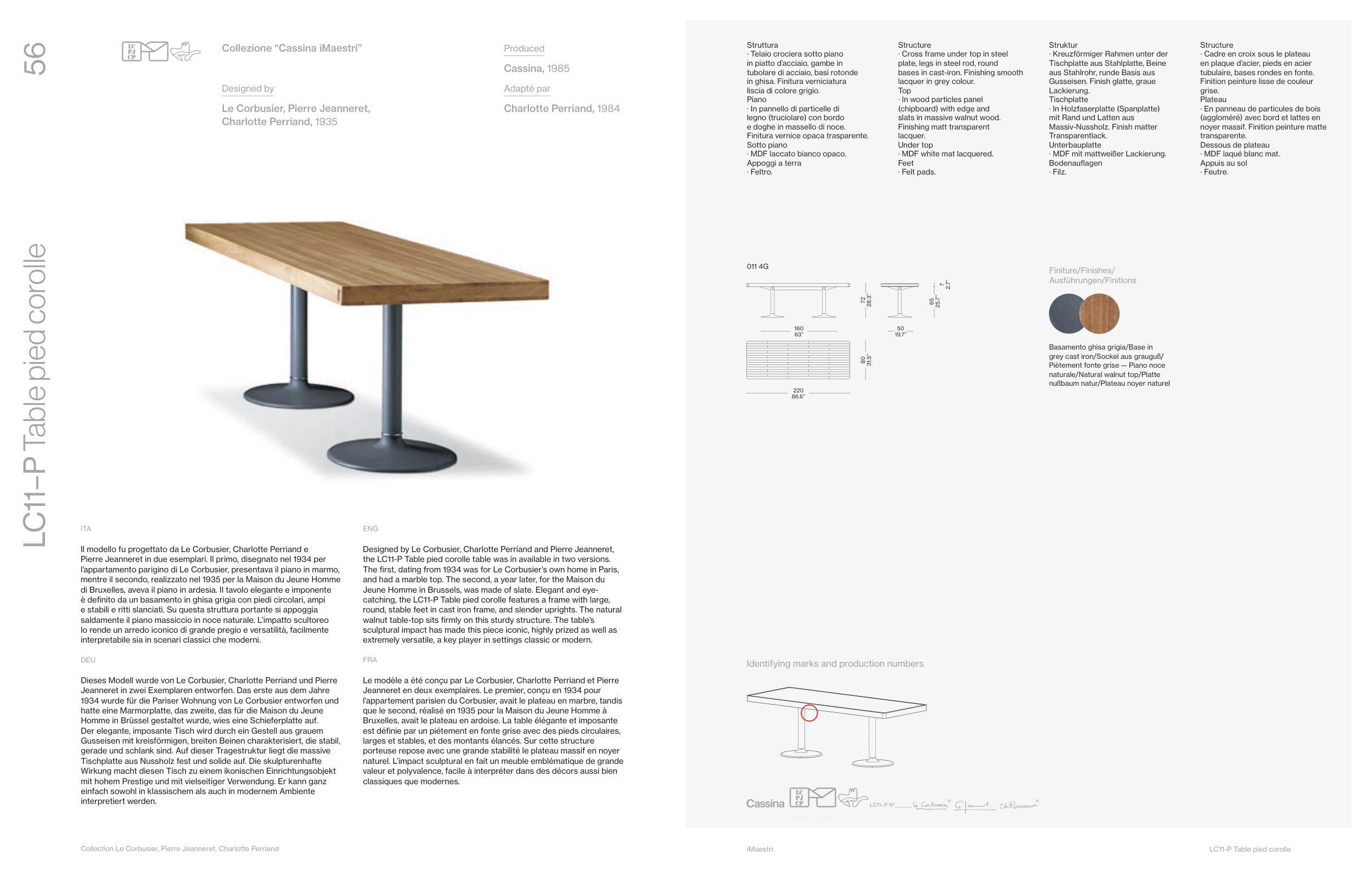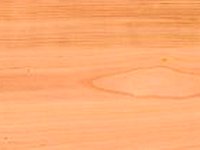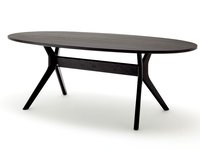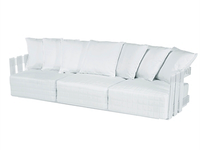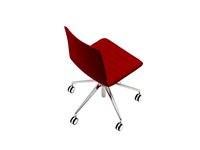Il modello fu progettato da Le Corbusier, Charlotte Perriand e
Pierre Jeanneret in due esemplari. Il primo, disegnato nel 1934 per
l’appartamento parigino di Le Corbusier, presentava il piano in marmo,
mentre il secondo, realizzato nel 1935 per la Maison du Jeune Homme
di Bruxelles, aveva il piano in ardesia. Il tavolo elegante e imponente
è definito da un basamento in ghisa grigia con piedi circolari, ampi
e stabili e ritti slanciati. Su questa struttura portante si appoggia
saldamente il piano massiccio in noce naturale. L’impatto scultoreo
lo rende un arredo iconico di grande pregio e versatilità, facilmente
interpretabile sia in scenari classici che moderni.
Designed by Le Corbusier, Charlotte Perriand and Pierre Jeanneret,
the LC11-P Table pied corolle table was in available in two versions.
The first, dating from 1934 was for Le Corbusier’s own home in Paris,
and had a marble top. The second, a year later, for the Maison du
Jeune Homme in Brussels, was made of slate. Elegant and eye-
catching, the LC11-P Table pied corolle features a frame with large,
round, stable feet in cast iron frame, and slender uprights. The natural
walnut table-top sits firmly on this sturdy structure. The table’s
sculptural impact has made this piece iconic, highly prized as well as
extremely versatile, a key player in settings classic or modern.
Dieses Modell wurde von Le Corbusier, Charlotte Perriand und Pierre
Jeanneret in zwei Exemplaren entworfen. Das erste aus dem Jahre
1934 wurde für die Pariser Wohnung von Le Corbusier entworfen und
hatte eine Marmorplatte, das zweite, das für die Maison du Jeune
Homme in Brüssel gestaltet wurde, wies eine Schieferplatte auf.
Der elegante, imposante Tisch wird durch ein Gestell aus grauem
Gusseisen mit kreisförmigen, breiten Beinen charakterisiert, die stabil,
gerade und schlank sind. Auf dieser Tragestruktur liegt die massive
Tischplatte aus Nussholz fest und solide auf. Die skulpturenhafte
Wirkung macht diesen Tisch zu einem ikonischen Einrichtungsobjekt
mit hohem Prestige und mit vielseitiger Verwendung. Er kann ganz
einfach sowohl in klassischem als auch in modernem Ambiente
interpretiert werden.
Le modèle a été conçu par Le Corbusier, Charlotte Perriand et Pierre
Jeanneret en deux exemplaires. Le premier, conçu en 1934 pour
l’appartement parisien du Corbusier, avait le plateau en marbre, tandis
que le second, réalisé en 1935 pour la Maison du Jeune Homme à
Bruxelles, avait le plateau en ardoise. La table élégante et imposante
est définie par un piétement en fonte grise avec des pieds circulaires,
larges et stables, et des montants élancés. Sur cette structure
porteuse repose avec une grande stabilité le plateau massif en noyer
naturel. L’impact sculptural en fait un meuble emblématique de grande
valeur et polyvalence, facile à interpréter dans des décors aussi bien
classiques que modernes.
ITA
ENG
DEU
FRA
Designed by
Le Corbusier, Pierre Jeanneret,
Charlotte Perriand, 1935
Produced
Cassina, 1985
LC1 N° ____________
LC2 N° ____________
LC3 N° ____________
LC4 N° ____________
LC5 N° ____________
LC6 N° ____________
LC7 N° ____________
LC8 N° ____________
LC9 N° ____________
LC10–P N° ____________
LC11–P N° ____________
LC12 N° ____________
LC14 N° ____________
LC15 N° ____________
LC16 N° ____________
LC17 N° ____________
LC20 N°
____________
LC11–P Table pied corolle
160
63”
50
19.7”
220
86.6”
72
28.3”
80
31.5”
65
25.7”
7
2.7”
011 4G
Struttura
· Telaio crociera sotto piano
in piatto d’acciaio, gambe in
tubolare di acciaio, basi rotonde
in ghisa. Finitura verniciatura
liscia di colore grigio.
Piano
· In pannello di particelle di
legno (truciolare) con bordo
e doghe in massello di noce.
Finitura vernice opaca trasparente.
Sotto piano
· MDF laccato bianco opaco.
Appoggi a terra
· Feltro.
Struktur
· Kreuzförmiger Rahmen unter der
Tischplatte aus Stahlplatte, Beine
aus Stahlrohr, runde Basis aus
Gusseisen. Finish glatte, graue
Lackierung.
Tischplatte
· In Holzfaserplatte (Spanplatte)
mit Rand und Latten aus
Massiv-Nussholz. Finish matter
Transparentlack.
Unterbauplatte
· MDF mit mattweißer Lackierung.
Bodenauflagen
· Filz.
Structure
· Cross frame under top in steel
plate, legs in steel rod, round
bases in cast-iron. Finishing smooth
lacquer in grey colour.
Top
· In wood particles panel
(chipboard) with edge and
slats in massive walnut wood.
Finishing matt transparent
lacquer.
Under top
· MDF white mat lacquered.
Feet
· Felt pads.
Structure
· Cadre en croix sous le plateau
en plaque d’acier, pieds en acier
tubulaire, bases rondes en fonte.
Finition peinture lisse de couleur
grise.
Plateau
· En panneau de particules de bois
(aggloméré) avec bord et lattes en
noyer massif. Finition peinture matte
transparente.
Dessous de plateau
· MDF laqué blanc mat.
Appuis au sol
· Feutre.
Adapté par
Charlotte Perriand, 1984
Collezione “Cassina iMaestri”
Finiture/Finishes/
Ausführungen/Finitions
Basamento ghisa grigia/Base in
grey cast iron/Sockel aus grauguß/
Piètement fonte grise — Piano noce
naturale/Natural walnut top/Platte
nußbaum natur/Plateau noyer naturel
LC1 N° ____________
LC2 N° ____________
LC3 N° ____________
LC4 N° ____________
LC5 N° ____________
LC6 N° ____________
LC7 N° ____________
LC8 N° ____________
LC9 N° ____________
LC10–P N° ____________
LC11–P N° ____________
LC12 N° ____________
LC14 N° ____________
LC15 N° ____________
LC16 N° ____________
LC17 N° ____________
LC20 N°
____________
Identifying marks and production numbers
56
Collection Le Corbusier, Pierre Jeanneret, Charlotte Perriand
LC11-P Table pied corolle
iMaestri


